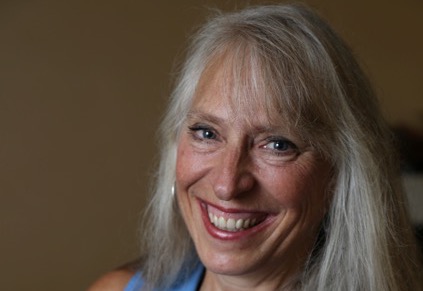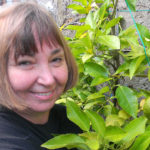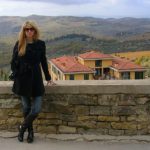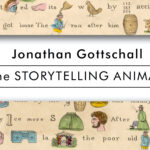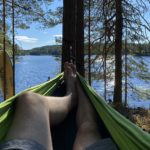Cindy Ross is an adventurer and long-distance backpacker and cyclist. She has completed the Triple Crown of American hiking: the Appalachian Trail, the Pacific Crest Trail, and the Continental Divide Trail. Cindy is the author of six books on adventuring in the outdoors, including Scraping Heaven: A Family’s Journey along the Continental Divide. Her latest book, The World is Our Classroom: How One Family Used Nature and Travel to Shape an Extraordinary Education, debuts this month. Cindy has written over 1,000 magazine and newspaper stories focusing on outdoor adventures and travel. She is the director of 501c3 non-profit River House PA, where she takes Veterans who have experienced the trauma of war out into nature to heal. She lives in New Ringgold, Pennsylvania, near the Appalachian Trail, with her husband Todd.
How did you get started traveling?
I began traveling, as in moving about, away from home, as a long-distance backpacker. I had already hiked the entire 2,100-mile National Scenic Appalachian Trail (AT) and the 2,600-mile Pacific Crest Trail (PCT) and had narratives published (and illustrated) about both of them before I ever got a passport. I began traveling the world after we had our two children, Sierra and Bryce. Our family got invited to cover the newly created 250-mile Czech Greenway from Vienna to Prague and promote family travel to this new trail. Our children were three and five at the time, and I landed many jobs writing magazine articles and front page travel stories in newspapers such as the Los Angeles Times.
We were all hooked. My husband and I wanted to continue to share the big world with our kids, knowing how much it had to teach. Before they went to college, our kids had visited over a dozen countries, where we stayed for at least a month, moving about under our own power, as in hiking or cycling. We believed that in this age of world-connection, it is important to raise broad-minded and empathetic children who are knowledgeable about other cultures. Nothing can do it like world travel.
How did you get started writing?
I hiked the Appalachian Trail when I was 24 and 25 years old, and it changed the direction of my life. I kept a journal on that momentous journey and had my first book published, A Woman’s Journey on the Appalachian Trail, which has been in print for 35 years. My formal background is in Fine Arts Painting, and A Woman’s Journey is more of an art book, with 125 drawings and the text in calligraphy.
I went on to hike the PCT and write about that adventure in Journey on the Crest. I had one more book published with Random House called Hiking: A Celebration of the Sport & the World’s Best Places to Enjoy It. It wasn’t until after that that I landed my first magazine gig with Backpacker Magazine. I kind of came into writing unconventionally — books before magazine articles.
What do you consider your first “break” as a writer?
I think I had a few “breaks.” My first book, A Woman’s Journey, getting published; the invite to the Czech Republic where I started to write international family travel; writing for Backpacker Magazine, where I was a Contributing Editor for seven years before I broadened out to other magazines; writing for JAXFAX Travel Marketing Magazine, where my editor sends me on many assignments around the world to write for his publication, and I never have to peddle to get a travel story published.
As a traveler and fact/story gatherer, what is your biggest challenge on the road?
Getting the material for the story that I want. When I am on a press trip, even if it is billed as an outdoor or an adventure trip, it is so dialed back for my needs, which is wanting more of a deep, rich, extended experience. I often made connections and then returned with my family to really get to know the heart of the country and their people. As a family travel writer, a big challenge is keeping a whole family safe and happy as opposed to a solo traveler, but then, the experience is that much richer having your favorite people in the world sharing it with you.
What is your biggest challenge in the research and writing process?
Drawing the line about how educated I need to become on a subject before I write about it. For instance, in my upcoming book, The World is Our Classroom: How One Family Used Nature and Travel to Shape an Extraordinary Education, I researched childhood development, the mechanics of how your brain learns, the mind overcoming risk in adventuring — many deeper layers that explain how travel and adventuring impacts and broadens us. All these explorations and inclusions make for a better book but it is difficult to gain a whole new set of knowledge with nearly every story or topic that I write about. But learning is good at every age!
What is your biggest challenge from a business standpoint?
I do not enjoy when I’m forced to be a collection agency and extract my pay from editors who have neglected that important area of a writer’s life. I do not enjoy dealing with disrespectful, unkind, and unfair editors. I would rather just write and not have to deal with inflated egos. I also find it extremely challenging to constantly have to say good-bye to an editor with whom I’ve enjoyed a wonderful working relationship as they move on and leave a magazine. I have a very hard time writing for tiny amounts of money for online magazines, so I usually don’t. I still love print, and love to see my work in print.
Have you ever done other work to make ends meet?
Since I began my adult life as a long-distance backpacker, we learned how little money and few material things are necessary in order to have happiness in your life. We created an independent, simple lifestyle where independence and freedom were of the upmost importance. We live debt-free in a log home that we built from scratch, growing much of our own food. All our residual money goes to travel, not to things like remodeling our home or buying a new car. A hefty income is not necessary for us and never was. I also make money from speaking, teaching classes, and workshops. Years ago, I was also a life drawing model for twenty years for artists. In fact, I wrote more than one book that way: Posing for a 20-minute stint and thinking; then writing ferociously on my five-minute breaks. Becoming a parent helps you learn how to “write around the edges of your life.”
What travel authors or books might you recommend and/or have influenced you?
I get the most out of excellent fiction. Reading very good writing helps improve my work. I saw it when we were hiking on the Continental Divide Trail. At that time, I was reading Barbara Kingsolver. After a long and eventful day on the trail (and every day crossing the Rockies with small children and llamas is eventful!), I would write in my journal. Then I would read a bit before shutting off my headlamp and attempting to sleep. But in just a few quiet moments, Kingsolver’s excellent use of language jogged my mind into thinking about a deeper layer, an insight, a bit of conversation, or an emotion that I had forgotten about or had not realized the importance of. I was forced to sit up, turn on the light, and get my journal back out, and I usually found some of these entries to be some of my best writing. Great writing makes us better writers.
What advice and/or warnings would you give to someone who is considering going into travel writing?
Don’t look to make a lot of money. You need to be in love with words, with telling a good story, with people and places. If you are honest about what you share and how you write, and if you write about what you know best, you will be successful as a writer. And you will be happy. Happy is what you should strive for.
What is the biggest reward of life as a travel writer?
Sharing the world with my children. In the past twenty-five years that I raised my children, using the big world as their most beloved teacher, I still cannot get over the tremendous and varied gifts this type of upbringing delivers. Travel has the ability to shape young people into compassionate, self-reliant and appreciative people, who as adults, come to care about the planet and all people. It made my children want to work as adults, to make the world a better place. This is the most important thing we can pass on to the next generation. And with my new book, The World is Our Classroom, I am excited to share what we learned. It helps me feel like I am doing something positive and helping in my small way.

